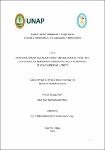| dc.contributor.advisor | Sosa Amay, Frida Enriqueta | |
| dc.contributor.author | Huaymacari Ruiz, Beatriz | |
| dc.date.accessioned | 2021-12-28T17:31:58Z | |
| dc.date.available | 2021-12-28T17:31:58Z | |
| dc.date.issued | 2021 | |
| dc.identifier.uri | https://hdl.handle.net/20.500.12737/7674 | |
| dc.description.abstract | Objetivo: Determinar los polimorfismos de nucleótidos únicos (SNP) en el exón 7 del gen CYP2D6, en pobladores étnicos de la Comunidad de Tempestad, Loreto. Metodología: El estudio fue de tipo descriptivo y de diseño transversal, la población correspondió a la etnia quichua, con una muestra de 24 individuos adultos, quienes previamente aceptaron voluntariamente participar en el estudio, firmando un consentimiento informado; la muestra de sangre periférica aproximadamente 0,8 mL fue soportada en papel de filtro. Se analizó el ADN cromosómico aislado por el método de QIAGEN, el cual se amplificó en la región del exón 7 del CYP2D6 identificándose las mutaciones puntuales - SNP. Resultados: Se analizaron 24 secuencias del ADN. de los cuales fueron:
El 75% de los haplotipos analizados (18/24) presentaron único variante alélica dentro de la secuencia. (SNP = C/G). El 4,17% de los haplotipos analizados (1/24) presentaron doble variante alélica dentro de la misma secuencia (SNP = C/G). El 20,83% de los haplotipos analizados (5/24) no presentaron amplificación del producto de la Reacción en Cadena de la Polimerasa – PCR. Por lo tanto, no se pudo concretar al análisis de la secuencia. Conclusiones: Es importante resaltar que el SNP (C/G) no muestra polimorfismo genético interindividual en los pacientes estudiados, la secuencia de los nucleótidos del ADN wild type el alineamiento demostró que hubo una variabilidad limitada que refiere un alelo de riesgo, la misma que se refiere a una o más variantes localizadas en la misma copia de un gen, un alelo de riesgo generalmente se asocian con una mayor probabilidad de desarrollar una afección, sin embargo, por sí mismos no determinan la variabilidad de detoxificación del organismo, por el simple hecho que estas mutaciones puntuales debe primero demostrarse si afecta la secuencia de aminoácidos en la expresión genética de la proteína CYP2D6. | es_PE |
| dc.description.abstract | Objective: To determine the single nucleotide polymorphisms (SNP) in exon 7 of the CYP2D6 gene, in ethnic inhabitants of the Community of Tempestad, Loreto. Methodology: The study was descriptive and of cross-sectional design, the population corresponded to the Quichua ethnic group, with a sample of 24 adult individuals, who previously voluntarily accepted to participate in the study, signing an informed consent; the peripheral blood sample approximately 0.8 mL was supported on filter paper. The isolated chromosomal DNA was analyzed by the QIAGEN method, which was amplified in the exon 7 region of CYP2D6, identifying the point mutations - SNP. Results: 24 DNA sequences were analyzed. of which were: 75% of the haplotypes analyzed (18/24) presented a single allelic variant within the sequence. (SNP = C/G). 4.17% of the haplotypes analyzed (1/24) presented double allelic variant within the same sequence (SNP = C/G). 20.83% of the haplotypes analyzed (5/24) did not present amplification of the product of the Polymerase Chain Reaction - PCR. Therefore, the sequence analysis could not be specified. Conclusions: It is important to highlight that the SNP (C/G) does not show interindividual genetic polymorphism in the patients studied, the nucleotide sequence of the wild type DNA, the alignment showed that there was a limited variability that refers to a risk allele, the same as refers to one or more variants located in the same copy of a gene, A risk allele is generally associated with a greater probability of developing a condition, however, by themselves they do not determine the variability of detoxification of the organism, by the simple The fact that these point mutations must first be demonstrated if they affect the amino acid sequence in the gene expression of the CYP2D6 protein. | en_US |
| dc.format | application/pdf | es_PE |
| dc.language.iso | spa | es_PE |
| dc.publisher | Universidad Nacional de la Amazonía Peruana | es_PE |
| dc.rights | info:eu-repo/semantics/openAccess | es_PE |
| dc.rights.uri | https://creativecommons.org/licenses/by/4.0/ | es_PE |
| dc.subject | Mutación puntual | es_PE |
| dc.subject | Polimorfismo de nucleótido simple | es_PE |
| dc.subject | Exon | es_PE |
| dc.subject | Inductores de citocromo P-450 CYP2D6 | es_PE |
| dc.subject | Poblaciones indígenas | es_PE |
| dc.title | Identificación de las mutaciones puntuales en el exón 7 del gen CYP2D6, en personas procedentes de la comunidad étnica Tempestad, Loreto | es_PE |
| dc.type | info:eu-repo/semantics/bachelorThesis | es_PE |
| thesis.degree.discipline | Farmacia y Bioquímica | es_PE |
| thesis.degree.grantor | Universidad Nacional de la Amazonía Peruana. Facultad de Farmacia y Bioquímica | es_PE |
| thesis.degree.name | Quimico(a) Farmacéutico(a) | es_PE |
| dc.subject.ocde | http://purl.org/pe-repo/ocde/ford#1.06.03 | es_PE |
| renati.author.dni | 70136017 | |
| renati.advisor.orcid | https://orcid.org/0000-0003-1700-2128 | es_PE |
| renati.advisor.dni | 08591762 | |
| renati.type | http://purl.org/pe-repo/renati/type#tesis | es_PE |
| renati.discipline | 917046 | es_PE |
| renati.level | http://purl.org/pe-repo/renati/level#tituloProfesional | es_PE |
| renati.juror | Vargas Rodríguez, Rosa del Carmen Miluska | |
| renati.juror | Fernández Arellano, Lenin | |
| renati.juror | Ocampo Falcón, Charles | |
| dc.publisher.country | PE | es_PE |


